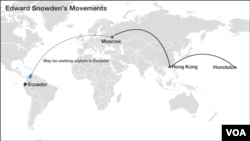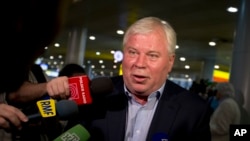MOSCOW —
Russia will allow former U.S. spy agency contractor Edward Snowden papers to leave the transit area of Moscow's Sheremetyevo airport.
He has been in limbo there since June 23, when he arrived from Hong Kong to evade espionage charges in the United States for disclosing details about secret U.S. surveillance programs.
May 20 - Snowden leaves Hawaii for Hong Kong.
June 1 - Snowden offers details of U.S. spying programs to Britain's Guardian newspaper. Stories are published in Britain and the United States, including on the existence of the program Prism and a court order to force telecoms company Verizon to hand over phone records of millions of Americans.
June 9 - Snowden goes public.
June 23 - Snowden arrives at Sremetyevo airport with Sarah Harrison, a British legal researcher for WikiLeaks anti-secrecy group.
June 24 - Snowden has seat booked for an Aeroflot flight to Havana but does not board.
June 25 - President Vladimir Putin says Moscow will not hand him over to the United States. The White House urges Russia to expel Snowden without delay.
June 26 - The U.S. Justice Department accuses Hong Kong of feigning confusion over Snowden's middle name so as not to detain him in May.
June 27 - China responds by accusing the United States of hypocrisy in the area of cyber security based on Snowden's revelations of U.S. National Security Agency activity in China.
June 27 - U.S. President Barack Obama says Russia or other countries considering asylum requests for Snowden should follow international law.
July 1 - Putin signals that Snowden can stay in Russia, if he stops “harming our American partners”. Snowden says he remains free to continue leaking data that “serves public interest” and he is seeking asylum in several countries, including Russia.
July 2 - Kremlin spokesman Dmitry Peskov says Snowden withdraws his request for political asylum.
July 3 - Bolivina President Evo Morales' plane is diverted on its way home from Moscow. It has to make an unscheduled stopover in Austria after there were “unfounded suspicions” that Snowden was on board.
July 5 - Venezuelan President Nicolas Maduro says he will offer asylum to Snowden. Nicaraguan head Daniel Ortega says his country could grant asylum “if circumstances permit”.
July 6 - Bolivia's Morales says he would grant Snowden asylum if he asked.
July 12 - Snowden meets human rights campaigners at the airport and says he will seek temporary asylum in Russia. U.S. State Department says giving him asylum would raise concerns in relations with Russia.
July 15 - Putin says he sees signs Snowden is shifting towards stopping “political activity” against the United States.
July 16 - Russian lawyer Anatoly Kucherena says he asked for temporary asylum in Russia. The White House reiterates Snowden should be returned to the United States to face trial.
July 17 - Putin signals he does not want to disrupt relations with Washington over the fate of Snowden.
July 19 - Kremlin says it is unaware of any plans by Snowden to seek Russian passport.
July 22 - Lawyer Kucherena says he hopes Snowden will be able to leave the airport transit zone by Wednesday.
He has been in limbo there since June 23, when he arrived from Hong Kong to evade espionage charges in the United States for disclosing details about secret U.S. surveillance programs.
May 20 - Snowden leaves Hawaii for Hong Kong.
June 1 - Snowden offers details of U.S. spying programs to Britain's Guardian newspaper. Stories are published in Britain and the United States, including on the existence of the program Prism and a court order to force telecoms company Verizon to hand over phone records of millions of Americans.
June 9 - Snowden goes public.
June 23 - Snowden arrives at Sremetyevo airport with Sarah Harrison, a British legal researcher for WikiLeaks anti-secrecy group.
June 24 - Snowden has seat booked for an Aeroflot flight to Havana but does not board.
June 25 - President Vladimir Putin says Moscow will not hand him over to the United States. The White House urges Russia to expel Snowden without delay.
June 26 - The U.S. Justice Department accuses Hong Kong of feigning confusion over Snowden's middle name so as not to detain him in May.
June 27 - China responds by accusing the United States of hypocrisy in the area of cyber security based on Snowden's revelations of U.S. National Security Agency activity in China.
June 27 - U.S. President Barack Obama says Russia or other countries considering asylum requests for Snowden should follow international law.
July 1 - Putin signals that Snowden can stay in Russia, if he stops “harming our American partners”. Snowden says he remains free to continue leaking data that “serves public interest” and he is seeking asylum in several countries, including Russia.
July 2 - Kremlin spokesman Dmitry Peskov says Snowden withdraws his request for political asylum.
July 3 - Bolivina President Evo Morales' plane is diverted on its way home from Moscow. It has to make an unscheduled stopover in Austria after there were “unfounded suspicions” that Snowden was on board.
July 5 - Venezuelan President Nicolas Maduro says he will offer asylum to Snowden. Nicaraguan head Daniel Ortega says his country could grant asylum “if circumstances permit”.
July 6 - Bolivia's Morales says he would grant Snowden asylum if he asked.
July 12 - Snowden meets human rights campaigners at the airport and says he will seek temporary asylum in Russia. U.S. State Department says giving him asylum would raise concerns in relations with Russia.
July 15 - Putin says he sees signs Snowden is shifting towards stopping “political activity” against the United States.
July 16 - Russian lawyer Anatoly Kucherena says he asked for temporary asylum in Russia. The White House reiterates Snowden should be returned to the United States to face trial.
July 17 - Putin signals he does not want to disrupt relations with Washington over the fate of Snowden.
July 19 - Kremlin says it is unaware of any plans by Snowden to seek Russian passport.
July 22 - Lawyer Kucherena says he hopes Snowden will be able to leave the airport transit zone by Wednesday.








